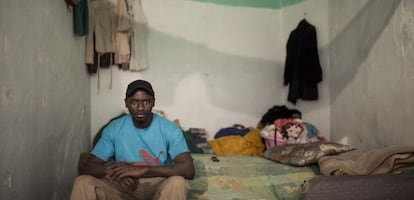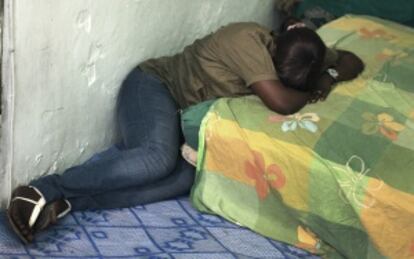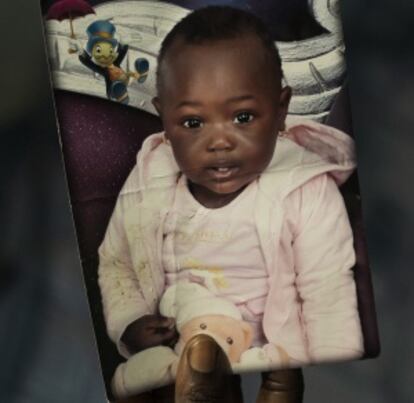Tears in Tangier for parents of baby who reached Spain without them
The family of 11-month-old Fátima, who arrived in Tarifa alone on a migrant boat, want her back

Corpa Diop is 33, Senegalese, and for the last week she has been crying nonstop. Sitting with her inside a 15-square-meter unfurnished room on the second floor of a building in Tangier, her husband John Mendi, 36, holds a photograph that explains the situation: it is a picture of Fátima, the 11-month-old baby that he left behind on a raft in his rush to get away from the Moroccan police on a Tangier beach.
Diop and Mendi are the parents of Fátima, who arrived alone at the Spanish coastal town of Tarifa last week as part of the biggest influx of migrant boats ever remembered on the coast of Cádiz.
Mendi shows his black eye as proof that he fought with Moroccan law enforcement officers and did not leave his baby behind in a premeditated manner. Speaking slowly in English, he explains that he was attempting to reach Spain with his family on board one of the many small inflatable dinghies that have been crossing the Strait of Gibraltar in recent days.

According to his version of events, when they ran from the shore to board the raft and get away from the Moroccan police, Mendi was the first to reach the vessel and put his baby on board, then turned back to help his straggling wife. But by the time they went back the raft had already left carrying two other babies, five women – two of them pregnant – and three men who took turns rowing.
Halfway across the Strait of Gibraltar, the migrants were rescued by the Spanish coastguard who took them to Tarifa, where a Red Cross volunteer renamed the baby Princesa (Princess). Princesa turned into the face of the migrant crisis until the Andalusian regional government found a foster home for her, where she will remain until her situation is cleared up.
Meanwhile, back in Tangier, her parents await news. They are in touch with the Andalusian government through María, a Spanish volunteer who works for Catholic charity Cáritas and visits them regularly. But the fact that they are both undocumented migrants makes family reunification more difficult.

The Madrid government has the final word on whether Fátima gets deported back to Morocco or whether her parents are allowed to come to Spain.
On the other side of the Strait, her parents know that she reached Spain safe and sound and they are very grateful to the Spanish family who is taking care of her. But they will not find peace until she is in her arms again.
Tu suscripción se está usando en otro dispositivo
¿Quieres añadir otro usuario a tu suscripción?
Si continúas leyendo en este dispositivo, no se podrá leer en el otro.
FlechaTu suscripción se está usando en otro dispositivo y solo puedes acceder a EL PAÍS desde un dispositivo a la vez.
Si quieres compartir tu cuenta, cambia tu suscripción a la modalidad Premium, así podrás añadir otro usuario. Cada uno accederá con su propia cuenta de email, lo que os permitirá personalizar vuestra experiencia en EL PAÍS.
¿Tienes una suscripción de empresa? Accede aquí para contratar más cuentas.
En el caso de no saber quién está usando tu cuenta, te recomendamos cambiar tu contraseña aquí.
Si decides continuar compartiendo tu cuenta, este mensaje se mostrará en tu dispositivo y en el de la otra persona que está usando tu cuenta de forma indefinida, afectando a tu experiencia de lectura. Puedes consultar aquí los términos y condiciones de la suscripción digital.








































